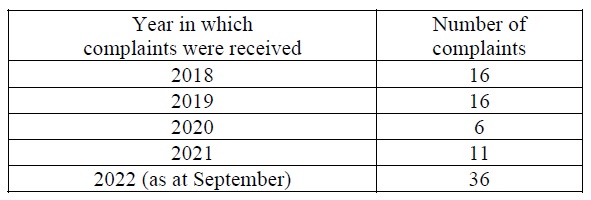LCQ18: Regulation of short selling activities
Question by the Hon Chan Chun-ying :
It has been reported that this year, the regulatory authorities in the United States and South Korea have conducted investigations into the short selling activities in their stock markets, and the illegal activities involved included “spoofing” tactics (i.e. placing fake orders in the market to drive a stock price up or down) and “scalping” transactions (i.e. short sellers cash in, without disclosure, the position(s) they hold). Regarding the regulation of short selling activities, will the Government inform this Council:
(1)whether it knows the number of complaint cases concerning malicious short selling activities received by the Securities and Futures Commission (“SFC”) in each of the past five years; if SFC has not maintained a record of the relevant figures, of the reasons for that;
(2)whether it knows if SFC has conducted investigations into the complaint cases referred to in (1); if investigations have been conducted, whether any market misconduct has been uncovered, and whether punishment has been imposed in respect of such market misconduct; if no investigations have been conducted, of the reasons for that; and
(3)whether it will draw reference from the practices of major overseas financial markets in combating illegal and illegitimate short selling activities, such as setting up a panel of inquiry on short selling, so as to step up the protection for investors; if not, of the reasons for that?
Reply by the Secretary for Financial Services and the Treasury, Mr Christopher Hui:
Hong Kong has a highly open and internationalised market, which provides an efficient and transparent trading platform with a robust and internationally aligned regulatory regime. The Government has been working closely with the financial regulators to enhance the regulation of financial markets, and prepare and put in place contingency plans for coping with various risks.
To monitor the securities market, the Securities and Futures Commission (“SFC”) assesses systemic risks through a series of risk management measures, which include closely monitoring trading and clearing operations, short selling activities, over-the-counter derivatives trading, financial soundness of intermediaries, etc., for maintaining the orderly and smooth operation of the financial markets amid volatility.
In consultation with SFC, my reply to the three parts of the question is as follows.
(1) From January 2018 to September 2022, SFC received 85 complaints related to short selling, with the majority involving SFC-licensed firms, listed companies and their substantial shareholders. The yearly breakdown of the number of complaints are tabulated below.

(2) Upon assessment of the 85 complaints mentioned above, SFC considered that there was sufficient prima facie evidence to commence detailed investigations into six. For the six cases
concerned, investigations of four were completed in which no market misconduct was found. The investigations of the remaining two cases are ongoing.
In addition to investigations arising from complaints as mentioned above, SFC also proactively initiates investigations into suspected illegal short selling activities identified through its internal surveillance mechanism. For the 13 investigations initiated proactively by SFC in the past five years1, one was successfully prosecuted.
(3) Hong Kong has a stringent short selling regime. The Securities and Futures Ordinance (Cap 571) prohibits “naked” or “uncovered” short selling conducted at or through a recognized stock market, i.e. short sale could not be conducted if the seller has not yet borrowed the stock or obtained a confirmation that the lender has the stock available to lend out. Generally speaking, when clients place short selling orders, they must provide documents to their brokers or agents confirming that a stock borrowing arrangement is in place, or an assurance that the stock has been borrowed. Brokers or agents must keep a full audit trail for all short sales conducted.Failure to comply with the requirements is a criminal offence punishable by fine and imprisonment.
In June 2012, SFC introduced a short position reporting regime under which reportable short positions must be reported to SFC on a weekly basis. The aggregated short positions reported would also be published by SFC. The short position reporting regime was expanded in March 2017 to cover all securities eligible for short selling to further enhance SFC’s monitoring of short selling activities and improve market transparency. Breaches of these statutory requirements may result in criminal prosecution.
Apart from the statutory requirements, the Rules of the Stock Exchange of Hong Kong require that covered short selling is permitted only for certain designated securities with high liquidity, and must be executed only on its trading system at or above the best current ask price (the so-called “tick rule”). In addition, the Hong Kong Securities Clearing Company Limited (“HKSCC”) has implemented measures to prevent brokers from late delivery. If a broker fails to deliver securities to settle its short transactions on the settlement day (i.e. T+2), HKSCC will execute compulsory buy-in. SFC will continue to review and if necessary, enhance the short selling regime having regard to changing market activities and global regulatory developments.
On enforcement, SFC monitors different trading activities of Hong Kong’s stock and derivative markets, including short selling, and inquires into irregularities to deter unlawful or improper activities. SFC is empowered by the Securities and Futures Ordinance to carry out investigations, including inspecting books and records of listed companies where misconduct is suspected, and cooperating as necessary with enforcement agencies and regulatory bodies in and outside Hong Kong in investigations.
